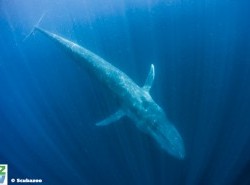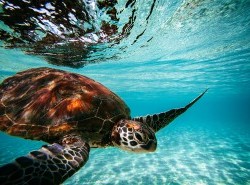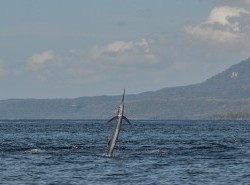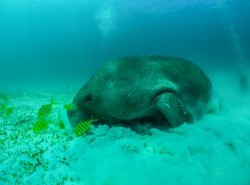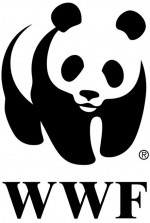On a coral reef ecology lesson in the Wakatobi Islands, my students and I snorkel over a dazzling world of swaying anemones, giant clams and colorful fish. Bobbing in the translucent waters, we pass over hard and soft corals, sea fans, sponges and star fish and swim through a dream world of kaleidoscopic life forms, colors and sensations.
A shallow fringing reef in Wakatabi
Located off the southeastern coast of Sulawesi, Indonesia, the Wakatobi Islands sit at the edge of the Banda Sea in the very heart of the Coral Triangle, the marine counterpart to the Amazon rainforests. Both hold unique life forms and ecological significance for our planet. And both are under siege.
The kids around here spend almost as much time in or under the water as they do on land
The rainforests of the Amazon basin encompass over 2,700,000 square miles, sprawling across nine nations. These ancient forests represent over half of our planet’s remaining tropical rainforests. Having existed for at least 55 million years, the Amazon is the richest and most biodiverse terrestrial ecosystem on our planet, sheltering tens of thousands of species, innumerable traditional cultures and sustaining the lives of millions.
The Bajau Laut have adapted to being more sedentary - but many can't bring themselves to actually live on land, preferring stilt houses
Because of its staggering biodiversity, the Coral Triangle has often been called the “Amazon of the Oceans.” Like the Amazon the area it covers is vast, stretching over 3.5 million square miles of tropical-ocean and sustaining the lives of over 120 million people across the borders of Indonesia, Malaysia, Papua New Guinea,
Another picture postcard palm fringed island with fringing reef
The Coral Triangle’s large area and extraordinary range of habitats make it the global epicentre of marine biodiversity on our planet. At least 500 reef building corals and more than 3,000 species of fish, six out of seven of the world's sea turtle species, caetaceans, sharks and whale sharks all thrive here.
Reeef fish for sale in a local market
A little boy prepares his line for a spot of fishing
Kids like these are the future guardians of the Coral Triangle's reef ecosystems
But like the Amazon, the Coral Triangle is imperiled by humans. Climate change in particular threatens both reefs and rainforests worldwide. As tropical forests are cleared, immense amounts of carbon are released into the atmosphere fuelling warming that changes sea chemistry and raises water temperatures stressing reef ecosystems and causing massive bleaching events worldwide. We're witnessing this right now with the combined effects of the biggest El Nino event in history and the clearing of Indonesia's rainforests to make way for palm oil plantations.
Fish drying in a Bajau Laut village
Pollution, coastal development, overfishing and siltation all threaten the Coral Triangle’s reefs. As rainforests are cut down and cleared in places like Borneo and Sumatra, the massive root systems that once held the soil in place disappear too. In turn, huge amounts of soil are washed into the ocean. These sediment loads wash onto reefs and the millions of species that call them home, while obscuring the sunlight corals need to photosynthesize and thrive.
A Bajau fisherman - many have been reduced to scavenging for reef species as fish stocks have plummeted
Threats such as these directly affect the people who depend on these reefs for their livelihoods. People like the Bajau, one of the last nomadic marine communities in the world, who for generations have plied the Coral Triangle as hunter gatherers.
A Bajau Laut prepares to go diving with his homemade spear gun, or pana
Traditional subsistence based cultures, like the Bajau’s, have helped sustain a healthy natural world for centuries. Yet within only the last few decades coral reef and rainforest ecosystems that traditional peoples depend on have been drastically altered.
A boat after the morning fish is complete
The Amazon and the Coral Triangle are besieged by many of the same threats in the 21st century, and through climate change their fates are intertwined. The ecological knowledge that fosters low impact lifestyles and a conservation ethic is needed more than ever to protect our planet’s most biodiverse tropical wildernesses on both land and sea. Because the loss of these ecosystems would be an unprecedented catastrophe, not only for the millions who directly rely on them, but for all of humanity.
